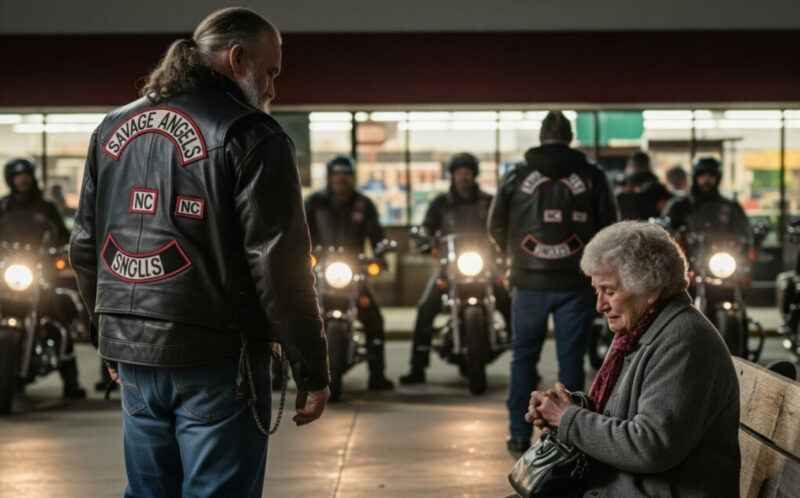Procure your own belongings, Mother. “I will be in the vehicle,” Paul stated.
Upon Margaret Carter’s exit from the grocery shop, carrying two small paper bags—her sole purchases under the constraints of her Social Security check—she saw that Paul’s SUV was absent. She remained seated on the frigid bench outdoors for over three hours, her delicate hands grasping the grocery list he had hastily written that morning. Subsequently, her phone vibrated with a message that shattered her reality: Margaret located a nursing facility with availability. They will collect you tomorrow. It is time. That was how her sole son communicated his decision to abandon her—via a text message. After all she had sacrificed: raising him single-handedly following his father’s premature death, working three jobs to finance his college education, and even selling her home to fund his wedding. Residential staging Her vision remained obscured by tears as the motorcyclists came. Seven of them, bellowing with such intensity that the ground appeared to tremble.

The leather vests displayed: Savage Angels MC. Margaret’s pulse quickened. She attempted to appear inconspicuous. An 82-year-old woman encountered difficulties with motorcyclists. However, the most imposing figure, a man with broad shoulders and a grey beard that grazed his chest, approached her directly. She grasped her handbag more firmly. “Madam?” Are you well? His voice was unexpectedly soft. “You have been seated here since our entry into the store.” Margaret’s lips quivered. “I am awaiting my transportation.” “In this frigid temperature?” How long have you been waiting? He exerted pressure. She was unable to respond. Her tears revealed her true emotions. The man, referred to by others as Bear, crouched to align his compassionate eyes with hers. “Madam, what is your place of residence?” She faltered, nevertheless murmured her address. A tranquil thoroughfare featuring small, antiquated residences. The bikers exchanged looks that she could not comprehend. Bear enquired, his voice now subdued: “Is your son named Paul Carter?” Her stomach sank. She acquiesced. Bear’s jaw clenched, however upon gazing at her once more, his eyes softened.

“Our intention is not to harm anyone.” However, we must escort you home. They carefully placed her into a sidecar, positioning her grocery bags at her feet. For the first time that day, she felt a sense of belonging. She felt accompanied. Secured. However, upon turning onto her street, Margaret’s heart shattered once more. Paul’s polished SUV was stationed outside her residence. The entrance door was ajar. The boxes—her boxes—were strewn around the grass resembling refuse. Residential staging Bear was already advancing along the walkway. Paul Carter exited the residence, irritation evident on his countenance. “What is this?” he enquired, his gaze shifting between the motorcyclists and his mother, who remained sat in the sidecar. Bear halted a few steps away, his mere presence sufficient to calm the street. “Are you Paul Carter?” Is he the son of Frank Carter? Paul inflated his chest, attempting to project an air of toughness. Affirmative. This is privately owned property. You must depart immediately. Residential staging The bear’s voice remained composed, yet it possessed significant gravitas. “Amusing observation.” I was acquainted with your father. At the age of seventeen, I was on a path towards incarceration—or something more dire. Attempted to syphon petrol from his truck. Your father did not contact the police.

Rather, he extended an invitation for me to enter. Your mother prepared a sandwich for me. He provided me with a broom in his garage and instructed me on how to earn a legitimate livelihood. Frank Carter preserved my existence. Paul’s confidence wavered. Margaret’s eyes widened; she had nearly forgotten that tale from decades past. The bear advanced another step nearer. Your father often stated that a man’s value is determined by his adherence to his obligations. It appears that you have overlooked the most significant loan you owe. He signalled to Margaret, who appeared diminutive and delicate in the sidecar. Paul gulped, looking at Margaret and then at Bear. “We are merely assisting her with her relocation,” he mumbled. “She requires professional assistance.” The bear shook its head. “Negative.” Her son is what she requires. However, due to his unavailability… He glanced back at his guys. “…she will have to accept us.” Young men, restore everything to its original state.

The bikers advanced like a covert battalion, elevating crates and transporting them indoors. They disregarded Paul’s objections, reinstating Margaret’s photo albums to the shelf, positioning her knitting basket adjacent to her chair, and meticulously arranging her groceries in the pantry. Paul and his wife Margaret—sharing the same name as his mother—stood impotently on the porch, unable to intervene. Following the replacement of the final box, Bear approached Paul. His voice was subdued, yet each syllable pierced sharply. “We constitute her family now.” We will come for groceries, medical appointments, and yard maintenance. If she merely stubs her toe, we will be informed. We will engage in a conversation with you. Is everything understood? Paul’s countenance became ashen. He acknowledged with a single nod. Subsequently, he and his spouse entered their SUV and departed silently. Margaret observed their go, her heart conflicted between sorrow and solace.

After years, she experienced the enduring impact of her husband’s legacy in an unforeseen location. That night, Margaret did not remain awake in a sterile nursing home bed. She slumbered in her own space, enveloped by the reminiscences of a life constructed with her deceased spouse.The subdued rumble of a motorcycle engine maintained vigilance till morning. Days transformed into weeks, and weeks into months. Paul did not make any further calls. However, the Savage Angels did. Danny, the youngest motorcyclist adorned with tattoos on his arms, visited every Saturday to assist with the garden. Bear repaired her leaking roof and restored a damaged step on the porch. Another individual, referred to as Hawk, assisted her by carrying her groceries during her visit to the market. They consistently prohibited her from lifting a hefty bag. They never permitted her to remain seated alone for an extended duration. On beautiful afternoons, they insisted on taking her for rides in the sidecar, her scarf billowing in the breeze. After decades, Margaret experienced the exhilaration of youth anew—the adrenaline of velocity, the mirth in her heart, the elation of camaraderie. She was referred to as Queen. Initially, she found the nickname amusing. However, each occasion she heard it—whenever a robust rider smiled and remarked, “Morning, Queen”—her heart expanded with joy. She was no longer imperceptible. One evening, while seated on her porch, she perceived the distant murmur of engines. Rather than fear, she experienced warmth. The sound indicated that her family was en route. Not the son she nurtured, but the brothers her husband rescued. She then contemplated Frank. He had previously placed his faith in a wayward child with a poor disposition, offering him employment rather than retribution. The kindness had completed its cycle, long after Frank’s departure. As the motorbikes arrived and parked down her street, Margaret stood to welcome them. She was no longer only an elderly woman abandoned by her own kin. She was the Sovereign of the Savage Angels—esteemed, adored, and protected. For the first time in her 82 years, she realised that family transcended biological relations. The subject pertained to loyalty. It pertained to honour. It pertained to the principle of never abandoning an individual.